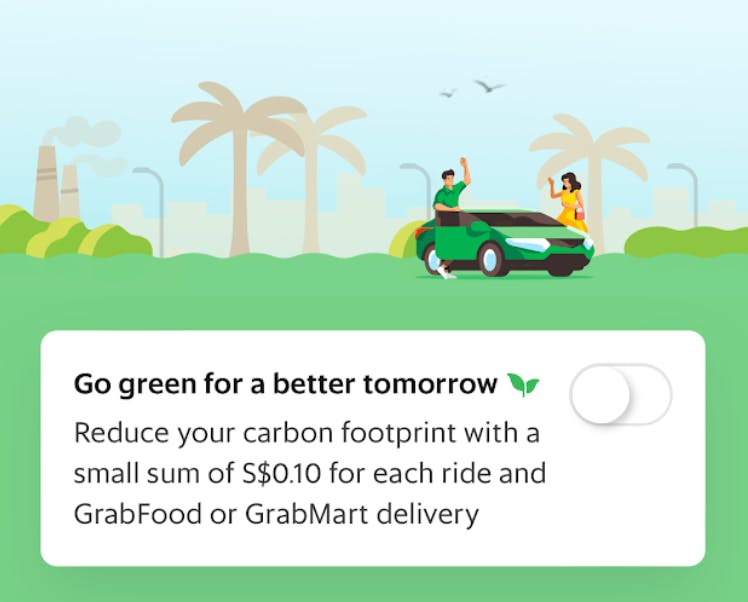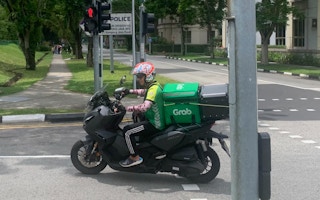A fee that ride-hailing app Grab charges its customers to mitigate the climate impact of their travel is based on discredited carbon offsets and exposes the company to greenwashing risk, Malaysian non-profit RimbaWatch has warned.
To continue reading, subscribe to Eco‑Business.
There's something for everyone. We offer a range of subscription plans.
- Access our stories and receive our Insights Weekly newsletter with the free EB Member plan.
- Unlock unlimited access to our content and archive with EB Circle.
- Publish your content with EB Premium.
The Singapore-headquartered mobility firm has enabled its customers to neutralise the emissions of their travel or deliveries since 2021, with a fee of S$0.10 (US$0.07) for each trip that goes towards the purchase of carbon credits.

Grab’s carbon offsetting function enables customers to offset the emissions of rides and deliveries by paying S$0.10 a trip. Image: Grab
The offsetting function has neutralised the emissions of more than 5 million trips and saved about 2,300 tonnes of greenhouse gas emissions, according to Grab’s website.
The carbon credits Grab sources fund projects certified by Verra, a standards body that faced heavy scrutiny last year over the credibility of its methodology and the credits it supplies.
Grab buys carbon credits from the Katingan Mentaya Project, a peatland forest protection and restoration project in Central Kalimantan, which RimbaWatch highlighted has been criticised over claims made about its effectiveness in reducing emissions. Grab claims that the project prevents the release of greenhouse gases equivalent to 447 million tonnes of carbon dioxide over 60 years.
The additionality of Katingan Mentaya Project – that is, its ability to reduce emissions that would not have been achieved without the project – was called into question in an investigation by Greenpeace in 2021, which found that the baseline calculation was based on forest that was already legally protected, so no emissions reductions took place. Greenpeace’s findings were followed up by an investigation by Nikkei Asia.
Permian Global, a carbon finance firm that manages the project, has rejected the allegations and defended its climate impact.
In a statement, Grab told Eco-Business that its carbon projects are “rated and verified by multiple reputable carbon credit agencies and suppliers,” citing Sylvera and BeZero as having rated the Katingan Mentaya Project as “AA” and “A”, respectively.
Carbon exchanges in Southeast Asia including Bursa Malaysia’s Carbon Exchange and Temasek-backed Climate Impact X in Singapore, have listed the project, the company added.
A Grab spokesperson told Eco-Business that although there are currently no universally aligned carbon market standards, the company did not want to rule out carbon credits as “a legitimate financial instrument for long-term environmental good.”
“We will continue to hold a high bar to our suppliers to ensure our selected projects support this intended outcome, and hope the industry will keep debating the topic and work constructively together towards a lower carbon future,” a spokesperson said.
RimbaWatch said that while it supports Grab for setting a net-zero by 2040 commitment and for pledging to decarbonise its fleet of millions of vehicles, “the use of offsets … cannot be a part of a credible net-zero strategy”.
Grab launched the offsetting feature just under a year after rival Gojek launched its own offsetting service for its customers, and four months after news emerged that Grab was hatching a plan to decarbonise.
Grab’s offsetting feature for its customers is not part of the company’s own commitment to neutralise its emissions, which focuses on the electrification of vehicles and route optimisation to reduce emissions, added the company spokesperson.
Where the company cannot reduce emissions, it follows the Science Based Targets initiative (SBTi)’s guidance on carbon offsetting, although Grab said that it does not buy any carbon credits towards its carbon neutrality target.
Grab committed to be carbon neutral by 2040 in 2022, a pledge the company has said was difficult to make because of projected business growth and nascent renewable energy capacity and electric vehicle charging infrastructure in Southeast Asia, among other obstacles.
RimbaWatch said that Grab should align with emerging international standards around offsetting and consider abandoning offsets completely – unless they are promoted only as a voluntary donation to conservation which does not influence Grab’s emissions inventory or climate action.
The United Nations UN High-Level Expert Group on corporate net-zero pledges stated in 2022 that companies should not “buy cheap credits that often lack integrity instead of immediately cutting their own emissions across their value chain”.
The group has warned that carbon credits cannot contribute to emissions reductions to achieve net-zero targets, and can only be used after targets are met.
The European Union recently banned advertisements which use carbon offsets to claim a product is “carbon neutral”.
The latest controversy to hit a carbon offset project emerged this month, when a report from Human Rights Watch, a non-profit, alleged that Indigenous people in Cambodia faced forced evictions and criminal charges after their ancestral lands were designated for a carbon offset project.
RimbaWatch noted that companies such as oil major Shell, low-cost airline EasyJet and consumer goods giant Nestle have abandoned carbon offsets altogether, while companies which continue to claim carbon neutrality through offsets are facing legal action, including a US$1 billion lawsuit against Delta airlines.










